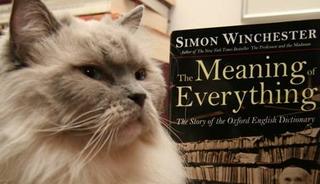 My cat Jack and I just finished reading a great book together. I am still not sure which one of us enjoyed the thing more.... probably he did. There was a lot of meowing about it, this much I know. He can be a bit pedantic.
My cat Jack and I just finished reading a great book together. I am still not sure which one of us enjoyed the thing more.... probably he did. There was a lot of meowing about it, this much I know. He can be a bit pedantic.At any rate, it was Simon Winchester’s The Meaning of Everything: The Story of The Oxford English Dictionary. Those who read this blogpage a bit will recall that I have a nagging hankering for the OED. And just a couple of weeks ago I attended a bit of a speech thingamajig at the bookstore, in which a real guy from Oxford University Press was regaling a roomful of Dictionary-geeks with OED-lore. [see blog of Aug.20th, “From The Ox’s Mouth”].
Thing is, I love words, and I make no excuse for it. It’s part of my DNA.
One of my favorite lines in the book is this one:
"I rather wish I could have a go at it."
[For the life of me, it looks as though this is what Jack is thinking, in the above photo... although he is probably referring to my letting him out on the balcony to get at the pigeons!]
However, as it appears in the Winchester book, no one could have ever estimated the dogged determination behind those simple words, “I rather wish I could have a go at it.”
They were uttered by the 38-year old bank clerk, James Augustus Henry Murray in response to a suggestion that he consider becoming the editor of the then floundering OED project. Indeed, at the time (March, 1876) all indications were that the unprecedented work, intended to supercede the previous philological undertakings of Samuel Johnson, Charles Richardson, and Noah Webster, would fail.... that it would in fact never reach completion.
But it was completed, and Winchester has given us a fascinating glimpse into the arduous journey of the OED.
I enjoyed every moment of reading it.
When I told friends what I was reading, several of them looked at me like I was crazy. "You're reading a book about a dictionary?"
But the author is passionate about his topic, and really, his reader finds out that there is a lot more to the compilation of "the meaning of everything" than you could ever imagine. Incredible feats of organization and participation were required. Incredible setbacks were overcome, time after time. Hundreds and hundreds of people, the great majority being volunteers, were enlisted in a project lasting over seven decades. The result, in 1928, was a mind-numbing 178 miles of typeface within twenty volumes of morocco leather!
And in its revisions, the OED remains to this day, indisputably, the world's greatest dictionary of the English language. It's all in there, in greater detail, accuracy and completeness than any other publication, before or since. From "aal" [the Bengali or Hindi word for a plant similar to madder, from which a dye could be extracted for coloring clothes], to "zyxt" [an obsolete Kentish dialect word for the past participle of the verb to see].
Eegads!
Can you imagine playing a game of Balderdash with this Murray guy?
Who would stand a chance of stumping this dude with a homemade definition?
James Murray would not live to see the finished product.
This honor would fall to the then Editor-in-Chief, Sir William Craigie. However, it was as certain to all of those working through the final stages at that time, as it is to us reading of it today, that were it not for the heroic determination of Murray, the OED as we know it, would most likely never have survived the initial complications of its existence.
It would not exist today.
Winchester has told a grand, wonderful story about a process that, in the hands of a lesser writer, could be as boring as cabbage growing.
He brings it to life. It is one of the best things I've read all year.
Jack says so too!
_____________
No comments:
Post a Comment
Thank you for your words!